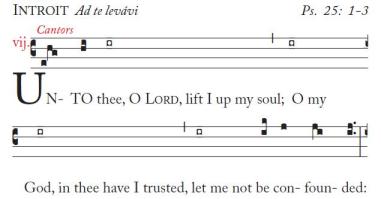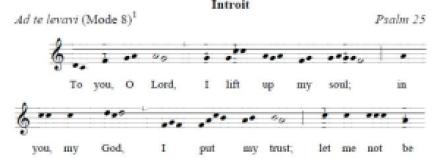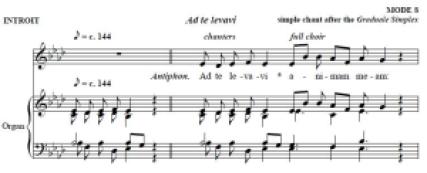The title here is more a string of keywords that bring a lot of people to this site. I have addressed this issue before where I essentially said that it’s much easier to just learn how to read square-notes. I still believe that, but that only addresses one of the issues in the use of the Liber Usualis [big PDF download warning]—it’s also not in English…
The best response, well, I’ll just leave that unsaid… but I will point you to a growing set of resources that have come to my attention. What I’ll try and do here, is to give you some small snippets of what you can find in these resources in comparison with a bit of the Liber itself. So, without further ado, a snippet from the Introit of Advent 1:

The Anglican Use Gradual: This gradual contains the Propers for the Mass according to the Anglican Use of the Roman Catholic Church. While it retains the use of square-notation, it is in traditional-language (Rite I) English. Its base material is drawn from the current (1979) Graduale Romanum so it follows the same basic kalendar as the RCL. (I.e., the last proper of the liturgical year is for Christ the King.) For the most part, it presents the propers using the Rossini “psalm-tone” settings:

but on occasion presents a more full and complex setting—as with the Introit for Advent 1:

It also sometimes includes chants that match with the three-year lectionary but this seems rather infrequent and haphazard. Overall, this work is very nicely produced with all of the seasons, commons, propers for major saints, and votives included masses for the departed that one would need. A section at the back includes common tones for the Asperges/Vidi Aquam, Preces, Gloria Patri, etc. A clear index wraps everything up.
Access/download is free but the work is copyrighted and a contact email appears for obtaining permissions.
Here is the PDF of the Anglican Use Gradual.
The American Gradual: This uses both modern notation and contemporary (Rite II) English but don’t on those accounts think that it’ll be “easier” than the Anglican Use Gradual… Bruce Ford here presents the real deal, a full transcription of the chants of the gradual. (It’s worth noting that he states clearly that his material is adapted from a German site that presents the chants alongside the actual early notation and that glosses the Latin in modern German.) Here’s a sample from this work:

Unfortunately, the copy I’ve found available for download only gives material for the Advent and Christmas seasons, ending with the Communion from Baptism of Our Lord (1st Sunday after Epiphany). I don’t know if other parts come available seasonally or not…
It lacks an introduction, table of contents and index, but it’s certainly got the goods muscially. It is copyrighted, but allows photocopying for the personal use of local churches and individuals provided they give correct attribution.
Here is the PDF of the American Gradual.
Archdiocese of St. Louis Worship Resources: These appear to have both psalm tone and other settings in English with modern notation and organ accompaniment. They’re also still under development. Some of the PDFs contain handwritten scores. Here’s a sample of one of the typed ones, though:

This site also contains some Office materials—proper Vespers settings. These may be in square notation. (The one I looked at was.)
So far it only offers Advent, Christmas and Lent, but promises that more settings will become available as the seasons progress.
These resources are collected here.
Files of the Yahoo Gregorian User Group: These are all user contributed and come in quite an array of formats, languages, etc. To access the files you must be a member of the moderated group. A wide and wild variety of things can be found, but be prepared to do some poking around to find what you’re after.
Here’s a sample of one offering:

The group is located here.
So—that’s everything that I know of that relates to English or modern notation and the Liber. If others know of more resources, drop it in the comments or shoot me an email.





